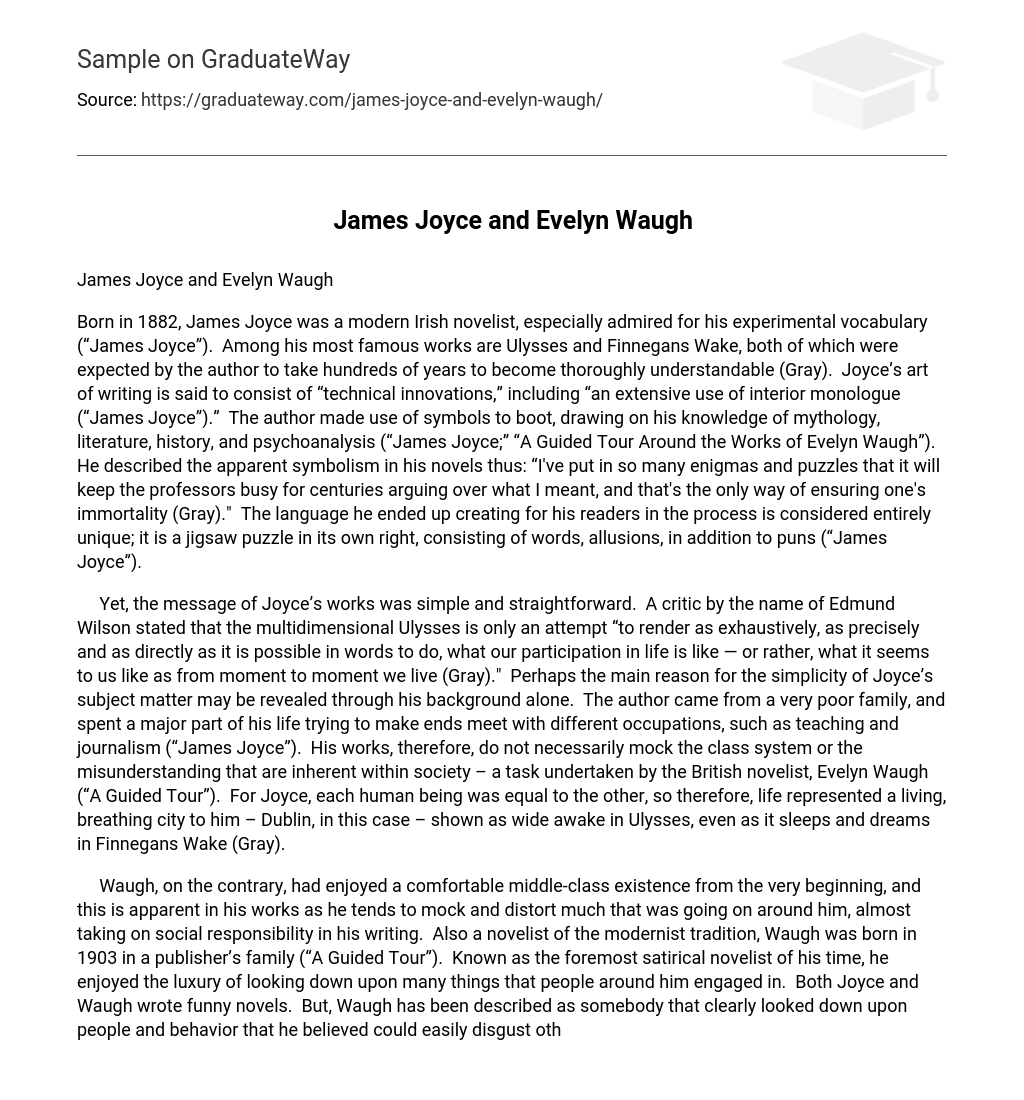Born in 1882, James Joyce was a modern Irish novelist, especially admired for his experimental vocabulary (“James Joyce”). Among his most famous works are Ulysses and Finnegans Wake, both of which were expected by the author to take hundreds of years to become thoroughly understandable (Gray). Joyce’s art of writing is said to consist of “technical innovations,” including “an extensive use of interior monologue (“James Joyce”).” The author made use of symbols to boot, drawing on his knowledge of mythology, literature, history, and psychoanalysis (“James Joyce;” “A Guided Tour Around the Works of Evelyn Waugh”). He described the apparent symbolism in his novels thus: “I’ve put in so many enigmas and puzzles that it will keep the professors busy for centuries arguing over what I meant, and that’s the only way of ensuring one’s immortality (Gray).” The language he ended up creating for his readers in the process is considered entirely unique; it is a jigsaw puzzle in its own right, consisting of words, allusions, in addition to puns (“James Joyce”).
Yet, the message of Joyce’s works was simple and straightforward. A critic by the name of Edmund Wilson stated that the multidimensional Ulysses is only an attempt “to render as exhaustively, as precisely and as directly as it is possible in words to do, what our participation in life is like — or rather, what it seems to us like as from moment to moment we live (Gray).” Perhaps the main reason for the simplicity of Joyce’s subject matter may be revealed through his background alone. The author came from a very poor family, and spent a major part of his life trying to make ends meet with different occupations, such as teaching and journalism (“James Joyce”). His works, therefore, do not necessarily mock the class system or the misunderstanding that are inherent within society – a task undertaken by the British novelist, Evelyn Waugh (“A Guided Tour”). For Joyce, each human being was equal to the other, so therefore, life represented a living, breathing city to him – Dublin, in this case – shown as wide awake in Ulysses, even as it sleeps and dreams in Finnegans Wake (Gray).
Waugh, on the contrary, had enjoyed a comfortable middle-class existence from the very beginning, and this is apparent in his works as he tends to mock and distort much that was going on around him, almost taking on social responsibility in his writing. Also a novelist of the modernist tradition, Waugh was born in 1903 in a publisher’s family (“A Guided Tour”). Known as the foremost satirical novelist of his time, he enjoyed the luxury of looking down upon many things that people around him engaged in. Both Joyce and Waugh wrote funny novels. But, Waugh has been described as somebody that clearly looked down upon people and behavior that he believed could easily disgust others (“Evelyn Waugh”). Indeed, Waugh was asking for societal change through his writings. He thought about politics as much as the snobbery of the upper class and the loss of culture among different peoples (“Evelyn Waugh;” “A Guided Tour”). As an example, he wrote: “’The Welsh,’ said the Doctor, ‘are the only nation in the world that has produced no graphic or plastic art, no architecture, no drama. They just sing,’ he said with disgust, ‘sing and blow down wind instruments of plated silver… (“Evelyn Waugh”)'”
Joyce described hellfire in The Portrait of an Artist as a Young Man. His most popular work, Ulysses, however, is a complete joy to read, despite the simplicity of its subject. Waugh’s writings, on the other hand, often took his readers through a journey of darkness. “[D]eath and manic violence” were concealed by “polite restraint” in some of his works (“A Guided Tour”). Waugh was known to have suffered from mental illness. It is for this reason perhaps that he also explored the subject of “lost youth” that must be evoked in a sensuous way, even as the present is cursed by all means (“A Guided Tour”). Although the author often attempted to cover up his dark insights with humor, complexity of emotions became a trademark of Waugh. He frowned upon hedonism in his writings. He also disdained snobbery, although his own name is considered “a signal of snobbery and a supercilious manner (“A Guided Tour”).” As a matter of fact, Waugh’s Brideshead Revisited glorifies the rich people in particular – or those that have the luxury of writing nostalgic stories about corruption as well as beauty during times of war (“Evelyn Waugh”).
Other famous works of Waugh include Vile Bodies and Black Mischief (“Evelyn Waugh”). Although each is considered a masterpiece, there is no way for readers to truly compare the works of Joyce and Waugh. Each of them belonged to the modernist tradition, but they wrote on separate themes altogether. As Joyce’s works dance in the ordinary, everyday lights of Dublin, now visible across the skies for the entire world to smile at; Waugh continues to disturb his readers through the complexities of emotions he experienced as a human being. At the same time, however, his readers are aware that such complexities are also a real part of human life. In point of fact, in the absence of writers such as Waugh, it would be more difficult than before to lead social changes. Joyce, on the contrary, leads his readers to enjoy life in the present.
Works Cited
“Evelyn Waugh.” Books and Writers. 2003. 22 Oct 2008. <http://kirjasto.sci.fi/ewaugh.htm>.
“A Guided Tour Around the Works of Evelyn Waugh.” Doubting Hall. 2007. 22 Oct 2008.
<http://www.doubtinghall.com/introduction/>.
Gray, Paul. “James Joyce.” Time. 8 Jun 1998. 22 Oct 2008.
<http://www.time.com/time/time100/artists/profile/joyce.html>.
“James Joyce.” The Literature Network. 2008. 22 Oct 2008. <http://www.online-
literature.com/james_joyce/>.





